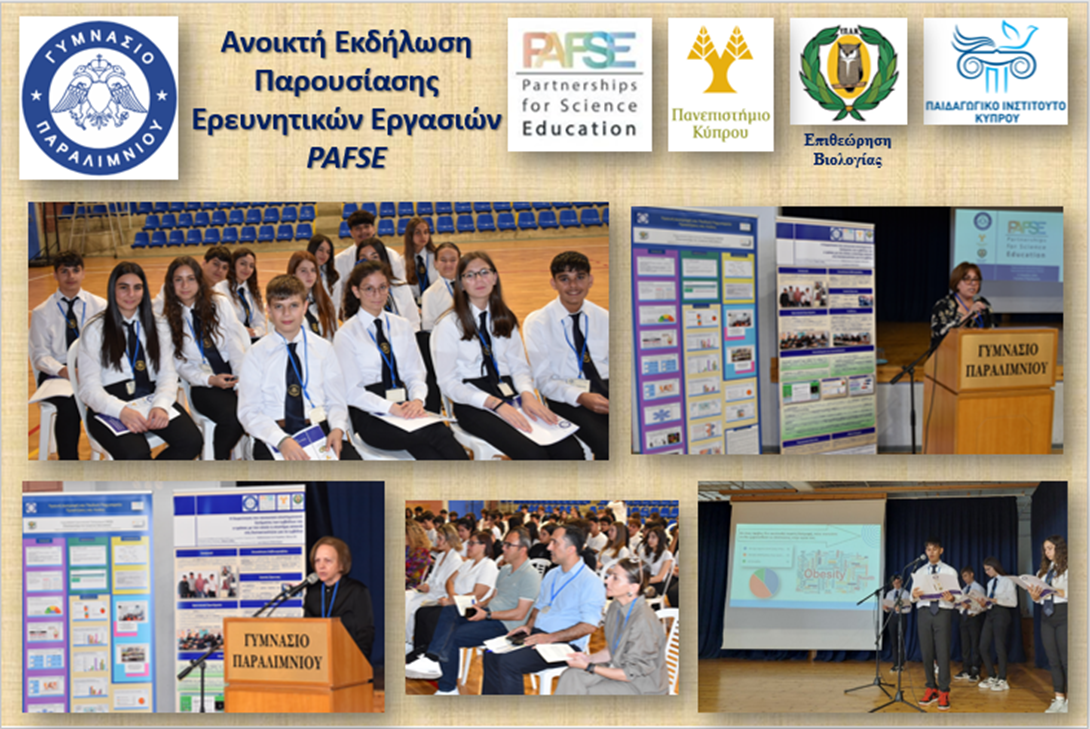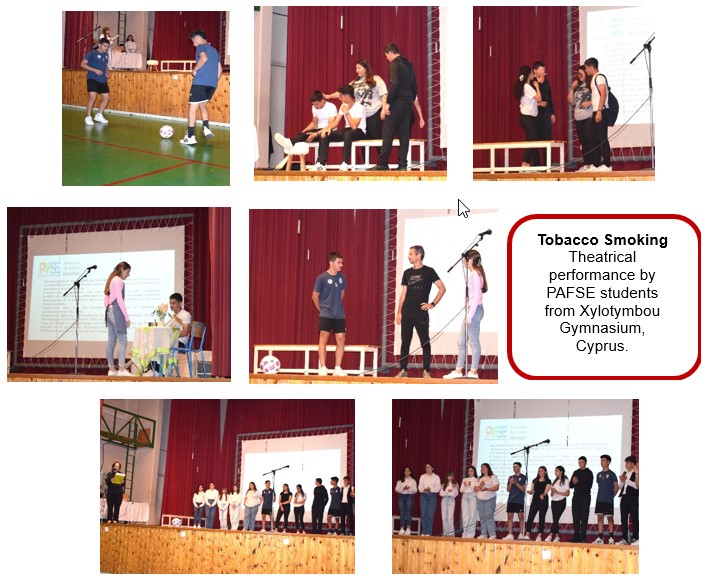University of Cyprus: PAFSE Educational Scenarios Implementations and Open Schooling Events for the school year 2023-2024
On April 17th, 22nd, and 23rd, 2024, secondary school students from three public schools in Cyprus participating in the PAFSE program (Paralimni Gymnasium, Xylotymbou Gymnasium, and Pangyprion Lykeio Larnacas) successfully presented and debated three different public health socioscientific issues during open schooling events. These issues served as the context for their investigations throughout the school year 2023-2024. Here’s a breakdown of the specific public health topics addressed by each school:
- Paralimni Gymnasium:
- Vaccines development and vaccinations: The science that responds to hesitancy (one event)
- Childhood Obesity: Challenges and solutions (one event)
- Xylotymbou Gymnasium:
- Tobacco smoking: The case of our school unit (one event)
- Pangyprion Lykeio Larnacas:
- Vaccines development and vaccinations: The science that responds to hesitancy (one event)
Cyprus PAFSE’s open schooling events for the school year 2023-2024 brought together over 350 participants from a wide range of backgrounds, including students, teachers, school leaders, scientists, parents, and members of the local community.
Each PAFSE investigation involved students in a series of learning activities. The main activities were:
- Identifying local public health challenges: Students started by finding public health socioscientific challenges relevant to their own communities.
- Development of knowledge and thinking skills: Through inquiry-based learning, students developed the conceptual understanding, epistemological understanding, and skills needed to address these public health socioscientific issues.
- School Project and community collaboration: Students addressed these local public health socioscientific challenges by working on PAFSE school project(s) that involved various community members such as students, parents, STEM educators, scientists, and local authorities. Various stakeholders supported the students through workshops, seminars, interviews, and the promotion of new technologies, including Extended Reality (XR) tools like Virtual Reality (VR) and Augmented Reality (AR).
- Project Documentation: Students documented their research findings and the process of their projects, including posters, PowerPoint presentations, debates, theatrical performances, and brochures.
- Sharing and Discussion: The culmination of the project was an open schooling event where students shared their research and experiences with parents, teachers, scientists, the local community, and other stakeholders. This fostered discussion and collaboration.
During the open schooling event, PAFSE students actively engaged with participants by sharing their research questions, methodology, results, and conclusions. They also distributed brochures on related public health topics. The final discussions centered around essential concepts, including the interconnectedness of health and society (social determinants of health) and the significance of school and community actions in promoting public health. Importantly, the event facilitated interactions among students, parents, teachers, scientists, community members, and policymakers. This collaborative space allowed for dialogue, debate, and reflection on the students’ research and public health challenges, fostering potential collaborations and future initiatives to address public health issues and enhance community well-being.
A central finding from the open schooling events in both the 2022-2023 and 2023-2024 school years (a total of 15 events) is that successful implementation of an open schooling model within the context of public health education necessitates a multifaceted approach. Key educational implications include: (i) Fostering Teachers’ Knowledge and Skills related to public health education: Teachers need support to effectively implement open schooling approaches. This involves enhancing their conceptual and epistemological understanding, as well as their related skills and competences. (ii) Integration into the school curriculum: Open schooling approaches should be integrated into the school curriculum. This ensures that students benefit from them as part of their regular learning experiences. (iii) Using Digital Tools and Resources: Providing access to a wider range of digital tools and resources enhances learning and collaboration. These resources can enrich students’ understanding of public health issues. (iv) Community Involvement: Promoting the involvement of parents, public health experts, STEM educators, civil society actors, and the local community is crucial. Their collective efforts activate students’ motivation to investigate public health socioscientific issues and contribute to a holistic approach to science and health education. (v) Investigation of Controversial Socio-scientific Issues with multiple dimensions: Investigating controversial socio-scientific issues with their multifaceted dimensions, including scientific, economic, political, cultural, and ethical considerations, can promote understanding of the complex nature of public health issues, the relationship between science and society, and their significance for health literacy.
Each PAFSE team of the PAFSE schools was supported by the PAFSE Project Researcher Dr Andreani Baytelman from the University of Cyprus.



